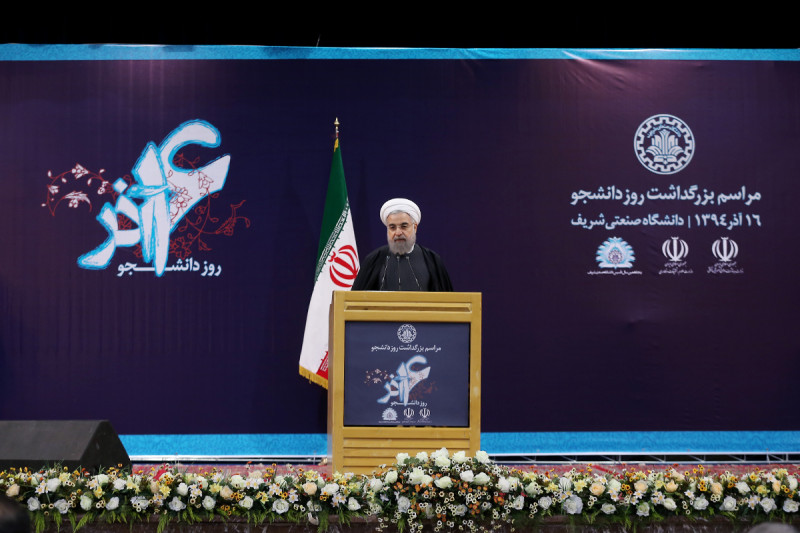PHOTO: President Rouhani addresses students and professors on Monday
President Rouhani, facing an ongoing challenge for Iran’s hardliners and conservatives, has made a call for consensus in February’s elections for Parliament and the Assembly of Experts, the body which chooses the Supreme Leader.
Speaking on National Student Day on Monday, Rouhani called for university students and professors to promote “justice, national sovereignty…[and] national interests”. He then indirectly took on the Guardian Council, which vets candidates and has disqualified Rouhani’s allies — notably former President Hashemi Rafsanjani in the 2013 Presidential election, which Rouhani subsequently won — in the past:
There is no authority in the Islamic Republic that is chosen without the people’s vote and saying that…there are two types of positions, appointed and elected, is insulting.
We are not infallible, but our [administration’s] efforts are aimed to serve the people and the country is taking steps towards success.
He pressed again for a restriction of the Guardian Council’s powers of vetting, saying, “The Constitution views the Guardian Council as an observer. We also recognize it as an observer.”
The President pushed back hardliners’ accusations of Government weakness, in the midst of the nuclear deal with the 5+1 Powers:
It is true that we must stand against others and solve our problems with domestic capabilities, but does this mean that we should not speak with the world and take our problems to the point of war? We stand against any possible conspiracy and win, but war should be the last choice….
The government’s actions over the past two years to strengthen and expand the country’s defense capabilities are equivalent to what has been done in the previous 10 years.
He then promoted his agenda of rescuing Iran’s economy, crippled by mismanagement, corruption, and sanctions, saying that he had reduced a 45% rate of inflation, when he took office in August 2013, to “single digits”.
Most striking was his continued call for opening up of political and cultural discussion, despite hardline warnings of “sedition” and foreign “infiltration”:
If free speech in the space of science and research is not permitted in the university, we will not be able to achieve our objectives in scientific and cultural development… Universities must use the opportunity to interact with the scientific world….
One of the important places where powers should be criticized is the university. If power does not come into question in a country, it will be dragged into deviation and autocracy.
While saying that he did not favor a specific faction, he told the audience, “Everyone must try to repeat the 1392 [2013 Presidential election] saga in the year 1394 [2016 elections] so that we can have a capable and powerful Parliament.”
On the Guardian Council: “My opinion regarding the Guardian Council is similar to the Constitution; the Constitution views the Guardian Council as an observer. We [the administration] also recognize it as an observer.” (President.ir) (President.ir) (E)

